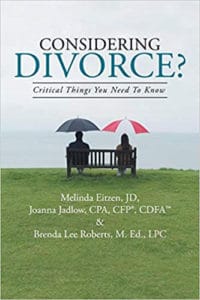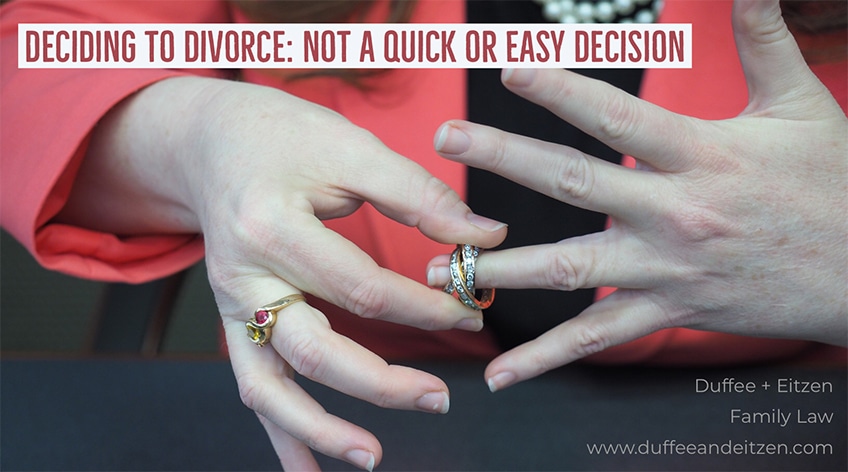The decision to begin the divorce process can be frightening and the unknown overwhelming. In working with couples in divorce situations, it has been our experience that either one or both of them have known that the marriage was over for some time. The decision to follow through with the divorce is usually avoided for a multitude of reasons such as “staying in it for the children,” “financially it’s not a good time,” “maybe they’ll change” and/or “I’d rather be ina terrible marriage than be single again.” Whatever the reason, people tend to stay too long. The idea in our society that people divorce rashly or on a whim has not been our experience. We see quite the opposite.
Sometimes, when a person has been in a marriage for a long time or has never been in a “good” romantic relationship, they become used to the situation and have trouble recognizing that this is not what marriage is supposed to be. A spouse may become accustomed to criticism, belittlement, screaming, be-ing ignored, never knowing where their spouse is, infidelity, having little or no access to marital funds, and numerous other unhealthy behaviors. It can be very difficult to recognize the problems and address them.
Before moving forward with divorce, people often want to make sure that they are making the right decision. It is not uncommon for a Family Law attorney to refer their client to a marriage therapist or individual therapist prior to filing for divorce in order to help their client gain clarity as to whether or not to move forward with the divorce process.
Marriage Counseling
Marriage counseling has the potential to help you avoid separation and divorce. It may help to relight the spark that went out, sometimes years ago. It can help improve communication, defuse anger, provide a new sense of hope, settle the panic, heal resentments, teach a new way of resolving conflict, renew trust, reduce conflict, increase intimacy, balance expectations, minimize defensiveness and teach you how to disagree without destroying the marriage. For those who truly haven’t made up their mind, marriage counseling can provide the platform for a couple to reconnect, recover from an affair, redefine expectations, identify new dreams, rekindle old dreams, build/rebuild communication skills, and allow for concrete changes to be made.
However, just scheduling the appointment and going to counseling does not save your marriage. It requires time and the commitment to doing an extensive amount of emotional work. Going just for the sake of going will not work. Marriage counseling only helps couples who want to help themselves. Just one person going to counseling can affect the marital relationship, but it won’t fix it. It takes both partners to work on the wholeness of their relationship.
There are some issues that marriage counseling cannot fix.
Honesty is imperative; it cannot work if both of you are not honest about your relationship histories and current marriage. There are many counselors who will not work with a couple if there is an active affair occurring. Marriage counseling cannot address addictions and the issues behind them. It cannot fix domestic violence problems. These are things that have to be addressed by participating in individual counseling and perhaps inpatient or outpatient treatment.
There are many people that do not begin marriage counseling until they have already decided to divorce. According to marriage and relationship expert, Dr. John Gottman,
“The average couple waits six years before seeking help for marital problems. Keeping in mind the fact that half of all marriages fail in the first seven years, the average couple lives for far too long with unhappiness.”
When people have already made up their minds to divorce before going to marriage counseling, they are often waiting for the opportunity or support that marriage counseling offers to deliver the message that they want to divorce or validation that it’s Ok to want to divorce.
Counseling is rarely a quick fix. Deep-seated issues and long-standing habits of dysfunctional communication in your marriage cannot be fixed overnight. It is hard work. Very rarely are the problems all one person’s fault; therefore, you both have to be willing to make changes. Sometimes additional work outside of marriage counseling may be needed, such as individual therapy.
Individual Counseling / Therapy
There are times when only one person in the marriage decides to go to therapy, either because their significant other won’t join them or because they need to see a therapist on their own to work through their questions about the marriage. Even when only one person in the marriage goes to therapy, it can affect the relationship. It has the potential to change the marriage positively or it may offer clarity to the individual on whether or not to stay in the marriage.
Individual therapy can also help with other issues that are impacting the marriage. It offers those with addictions the opportunity to find new ways of coping other than turning to alcohol, drugs, food, pornography or other destructive behaviors. It can provide support for victims of domestic violence. It may also be appropriate for batterers as it can help them work on anger management, stress relief and safe communication tools. For those needing additional support, therapists may also provide references to outside groups, such as addiction programs and batterer intervention programs.
Key Point: You do have choices.
By Melinda Hartman Eitzen, a partner at Duffee+Eitzen. She can be reached at melinda@d-elaw.com
 If you enjoyed this article, Deciding to Divorce: Not a Quick or Easy Decision, you can read more on this topic in the book CONSIDERING DIVORCE? CRITICAL THINGS YOU NEED TO KNOW, by Melinda Eitzen, JD, Joanna Jadlow, CPA, CFP®, CDFATM& Brenda Lee Roberts, M. Ed. LPC
If you enjoyed this article, Deciding to Divorce: Not a Quick or Easy Decision, you can read more on this topic in the book CONSIDERING DIVORCE? CRITICAL THINGS YOU NEED TO KNOW, by Melinda Eitzen, JD, Joanna Jadlow, CPA, CFP®, CDFATM& Brenda Lee Roberts, M. Ed. LPC
